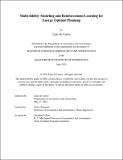Multi-fidelity Modeling and Reinforcement Learning for Energy Optimal Planning
Author(s)
de Castro, Luke
DownloadThesis PDF (1.772Mb)
Advisor
Karaman, Sertac
Terms of use
Metadata
Show full item recordAbstract
Modeling the energy consumption of a quadrotor involves complex electrical and physical dynamics, making it difficult to optimize over. We present a sequence-to-sequence multi-fidelity Gaussian process (MFGP) to learn a data-driven model to predict the energy required to fly a given vehicle trajectory. The goal is to create an accurate energy prediction that minimizes the number of expensive high fidelity simulations required for training. The MFGP algorithm can incorporate many low accuracy samples from a simple motor model with a few computationally demanding battery simulations to create a single accurate energy prediction. We perform sample efficiency experiments, finding a single fidelity model often needs 10 times more high fidelity data to match the accuracy achieved by the MFGP. The energy prediction model is then applied to a reinforcement learning (RL) agent, providing a reward signal to a minimum energy trajectory planner. The RL policy generates more energy efficient trajectories than those found by a nonlinear optimization baseline method, and we compare it to a minimum time RL model to show that the energy efficient policy is non-trivial.
Date issued
2024-05Department
Massachusetts Institute of Technology. Department of Aeronautics and AstronauticsPublisher
Massachusetts Institute of Technology